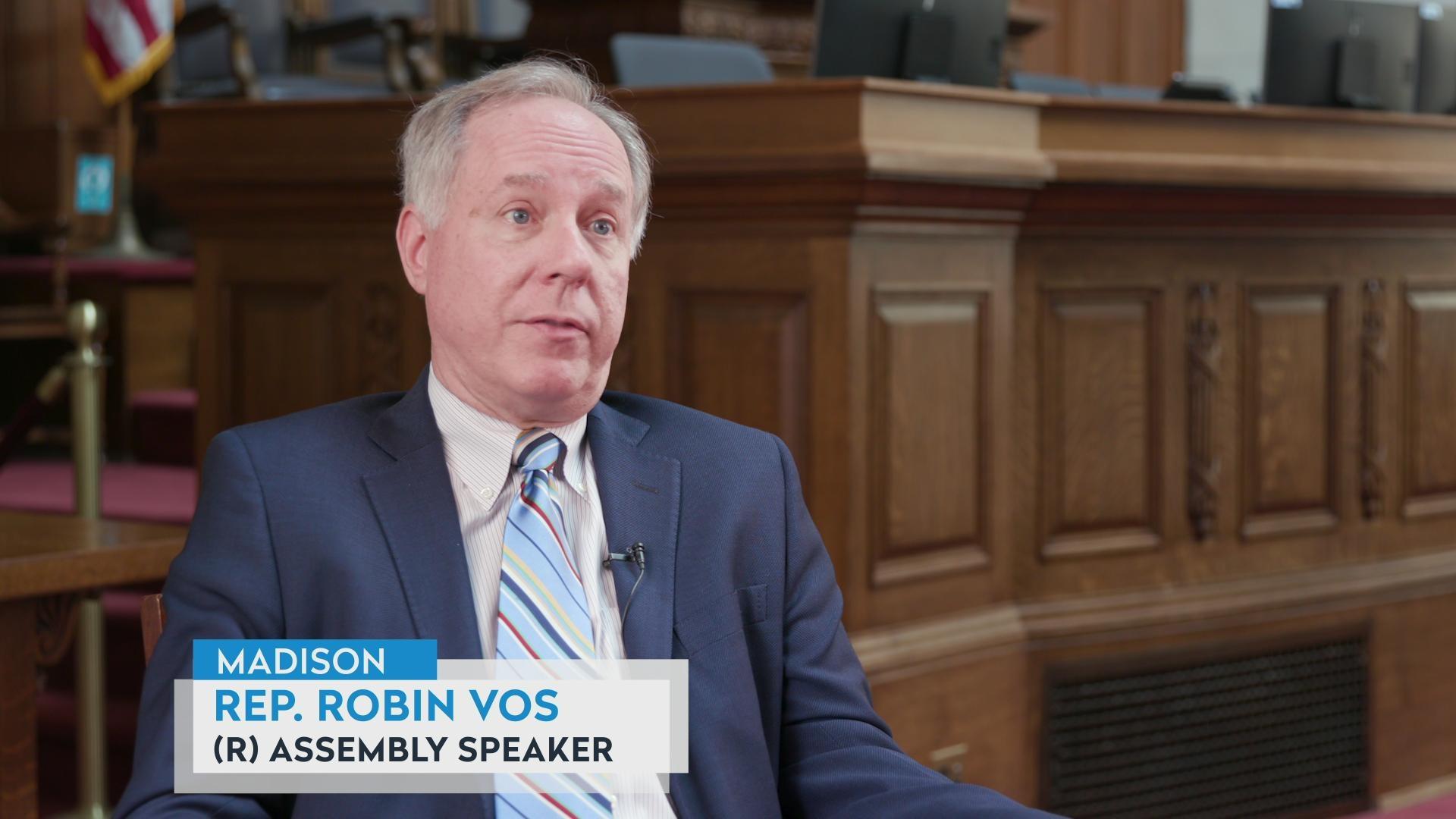Frederica Freyberg:
Act 10 has been in place for a couple of years now. It’s the law that eliminated most collective bargaining rights for most public employees. It also required increased health care and pension contributions on the part of those employees. Now, when we say most public employees, we mean all those except police and fire, or those in a protective occupation. Now, this is defined as active law enforcement, frequent exposure to a high degree of danger or peril, and a high degree of physical conditioning. Additionally, those in the protective occupation status must spend 51% of their time in active law enforcement. So think cops and firefighters, and people like state troopers and sheriff’s deputies. But what about jailers, many of whom are sheriff’s deputies? Well, according to a recent report by the Wisconsin Center for Investigative Journalism, in recent months at least ten counties in Wisconsin have stripped county jailers of this protective status. Under Act 10 what this means is higher employee contributions to benefits. It also means higher retirement age and the end of duty-disability payments. Currently, 46 counties in Wisconsin classify jailers as general employees, while 25 counties still consider them in a protective occupation. Changes for protected status employees in the wake of Act 10 do not sit well for the Wisconsin Professional Police Association and its executive director, Jim Palmer. He joins us in Madison. A Milwaukee area law firm is helping counties navigate the changes in employment status for jailers. Attorney Andrew Phillips of Phillips Borowski joins us from Marquette university. Welcome to you both.
Jim Palmer:
Thank you.
Andrew Phillips:
Thank you very much. Pleased to be here.
Frederica Freyberg:
I’ll go first to you, Jim Palmer. What is your opposition to switching jail employees out of this protective status.
Jim Palmer:
Sure, one correction real quick. With the law, 51% of their duties, not their time, their duties have to comprise those three criteria, active law enforcement, fire suppression, so on. But for many, many years, a number of counties throughout the state have classified their jail deputies as protective occupation participants, protective status. And they’ve done that because they recognize that those law enforcement officers in every respect perform a very high-risk function. Since the enactment of Act 10, at least ten counties, and now I think there are at least four more that are on the way appear to be stripping that protective status away from those jail deputies, in most cases without making any changes to those jail deputies duties. We think that’s wrong. We think that they’re motivated by a pure financial and short-term interest and not having to bargain with those employees.
Frederica Freyberg:
Let me go to Andrew Phillips. Why don’t you think that jailers meet the definition for the protected status?
Andrew Phillips:
Sure, and I want to be clear on this. It is not a matter of jailers or corrective officers automatically falling in one category or another. It is a very individualized determination based on an individual employee’s job duties, and what they actually perform on the job. And so when you say things like stripping them of protective status, that's troublesome simply because it’s not a function of the county making a decision one way or another. It’s application of a very well-established set of rules, regulations, laws and court decisions that talk about where employees need to be placed within the Wisconsin Retirement System. And counties have an obligation to get that right. The counties have a fiduciary obligation to that trust fund to make sure employees are categorized properly. I can’t tell you whether a mistake was made or what happened 20 years ago. All I can tell you is based upon the information that we review now what should happen now.
Frederica Freyberg:
Let me ask you, Andrew Phillips. The center for investigative journalism report talks about jailers having daily contact with potentially dangerous inmates, and they describe some jailers who are actually injured in this regard. And one of the tenets of this status is that you need to be in frequent exposure to a high degree of danger. So what about that, that jailers would in fact be in this position?
Andrew Phillips:
Well, it’s important to note, and I think you noted that in your introductory comments, is that there are three elements to determine if a person qualifies for protective status, and all three elements need to be met. In the counties with which we’re working, we’ve not taken a look frankly at the second or the third element, the high degree of danger or peril, or the high degree of physical conditioning. We focused on the definition of active law enforcement. And so I think that you can make an argument that the jailers, the corrections officers, are subject to a high degree of danger or peril. Frankly, there’s no reason for us to dispute that. There is some case law out there, there are court cases that have looked at that factor. But we don’t look at that factor. We look at the active law enforcement test, and frankly in the counties with which we’re working now, that’s where the focus has been. But you have to hit all three of those categories in order to qualify for protective status.
Frederica Freyberg:
Jim Palmer, your turn to respond to this.
Jim Palmer:
Sure. I have two responses to the notion that these counties have a fiduciary responsibility. I think if that were the sole motivation, the law does allow these counties to go back and amend prior years. If they’re going to fulfill their fiduciary responsibility, there is a way for them to do that. I think there are two reasons they haven’t. One, these county boards would have to admit what they believe to be a mistake that cost the taxpayers extra money. And, two, I think they, because of statute of limitations issues, they’d never be able to recoup that money that they think taxpayers overpaid. And the last point on this issue of fiduciary responsibility, Mr. Phillips has said repeatedly that these counties have a responsibility to do that, but by extension, he must also be saying that those counties that aren’t making that classification change to correct it, as he perceives it, are failing or violating that fiduciary responsibility. For example, Lafayette county, who Mr. Phillips recently represented, he did advise them that they needed to make this correction. They decided against that. So I don’t think that by his logic that he’s charging that Lafayette County Board of Supervisors hasn’t performed its duties, but that seems to be the necessary logical outcome.
Frederica Freyberg:
Let’s let him answer that. Do you think in Lafayette county the county is doing something wrong?
Andrew Phillips:
Based on my investigation of the facts and circumstances in Lafayette County, I do believe they are doing something wrong. But I can’t make a definitive answer on that, because I wasn’t given an opportunity to look at the definitive facts and circumstances. The fact that a mistake was made 20 years ago does not mean that mistake needs to be perpetuated. We have an opportunity to correct mistakes. ETF has a mechanism to correct that. It’s not even called a mistake. It's called incorrect designation. There’s no finding of somebody actually making an error. It’s simply a case of correcting a misreported category.
Frederica Freyberg:
Let me ask you this as well, Mr. Phillips. How much does reclassifying some of these employees in the jails potentially save counties in terms of increased contributions?
Andrew Phillips:
In terms of savings, and that term is a bit deceiving as well, because it is a matter of putting people in the right classification. I want to make that point clear, because there has been no county board that I've dealt with that has said we need to make this switch to save money. They've said we need to make the switch to comply with the law. But in terms of the cost to taxpayers and the cost to the counties for the incorrect designation, for a county like Ozaukee County it’s literally a quarter of a million dollars per year. That continues every single year.
Frederica Freyberg:
Let me ask you, Jim Palmer, what do you believe the ripple effects of reclassifying jailers especially for the sheriffs themselves?
Jim Palmer:
I think Mr. Phillips, one of his measures in terms of determining whether or not these employees meet the standard under the law for protective status is completely flawed and has no basis in any case or administrative rule or any legislation. What he has been doing, at least in three counties, Clark, Bayfield and Chippewa, after they had made the decision to strip the jail deputies of their protective status, after that point, they decided to conduct a one-week study and evaluate how much time, I believe in 15-minute increments, was spent doing their various duties. I think that’s a very dangerous measure to try and use. And I think it opens up a slippery slope for sheriffs, police chiefs, firefighters. Clearly if you were to take a one-week snapshot of any firefighter’s, you know, their time and what it's spent on, I think the active majority isn’t spent fighting fires.
Frederica Freyberg:
I need to give the final word to Andrew Phillips, so go ahead.
Andrew Phillips:
A firefighter is hired to suppress fires and protect…
Jim Palmer:
There is no basis at all for that statement.
Andrew Phillips:
I didn’t interrupt you. I would like to finish. A firefighter is hired to protect fires and prevent fires. That is the statutory definition of fire suppression. The statutory definition of active law enforcement is, are you hired to enforce the laws and do you have the authority to enforce the laws? That’s the test. It’s very well-established in case law, very well-established by the department of employee trust funds and all we’re doing is applying those very…
Jim Palmer:
We believe we…
[overlapping speakers]
Frederica Freyberg:
All right. We leave it there. Thanks to you, Jim Palmer and Andrew Phillips, joining us from Marquette.
Andrew Phillips:
Thank you very much.
Jim Palmer:
Thank you so much.
Search Episodes
News Stories from PBS Wisconsin

Donate to sign up. Activate and sign in to Passport. It's that easy to help PBS Wisconsin serve your community through media that educates, inspires, and entertains.
Make your membership gift today
Only for new users: Activate Passport using your code or email address
Already a member?
Look up my account
Need some help? Go to FAQ or visit PBS Passport Help
Need help accessing PBS Wisconsin anywhere?

Online Access | Platform & Device Access | Cable or Satellite Access | Over-The-Air Access
Visit Access Guide
Need help accessing PBS Wisconsin anywhere?

Visit Our
Live TV Access Guide
Online AccessPlatform & Device Access
Cable or Satellite Access
Over-The-Air Access
Visit Access Guide
 Passport
Passport


















Follow Us